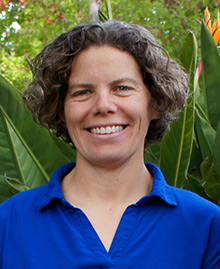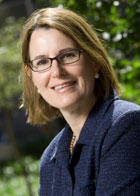
By Andrew Cohen
After an exhaustive, nationwide search, law school leadership found the best candidate for a newly created position right here, in its own ranks.
For Susan Whitman, Berkeley Law’s assistant dean of academic planning and curriculum, very good wasn’t good enough. While pleased with the strong performance of the law school’s LL.M. Legal Research and Writing Program, she and other faculty thought more could be done to give international lawyers the best possible training.
In response, they successfully urged the creation of a program directorship—believed to be the first among U.S. law schools. Betsy Candler, a highly regarded program instructor the past two years, was chosen to fill the new position.
“We’re not aware of any other law school that has a dedicated director of research and writing for LL.M.’s,” Whitman said. “We feel that this area should be a point of emphasis, and Betsy is ideally suited to develop our program. We picked Betsy for many reasons, particularly her commitment to LL.M. students and her ability to teach to their varied backgrounds, which she had demonstrated in the classroom.”
During the interview process, candidates taught a case like they would in class, with first-year writing instructors serving as mock students. After extensive interviews, the candidates were asked how they would guide the program and what innovations they had in mind.
“Betsy was clearly the most qualified,” Whitman said. “She has really high goals for what the program can achieve. You can’t just take the first-year writing curriculum and abbreviate it or impose it on LL.M students. For most of them, English is not their native language. You need a careful, strategic approach for introducing them to U.S. legal analysis.”
Whitman noted that the U.S. is a common law jurisdiction, and that its legal writing contrasts sharply with legal writing in other countries, many of which are civil law jurisdictions.
International intrigue
Berkeley Law’s summer Professional LL.M. program, now in session, has nine instructors reporting to Candler. During the traditional academic-year program, she will oversee about 140 LL.M. students spread over 10 sections—all taught by active practitioners.
“We have professional lawyers here from all over the world,” Candler said. “If there are 20 LL.M. students in class, you can have at least 15 different reasons for being there. That’s a fun challenge to take on.”

Candler worked for more than a decade as a criminal defense lawyer on cases in California and Georgia, including five years representing capital defendants in post-conviction proceedings. Shortly before joining Berkeley Law’s LL.M. writing program as an instructor in 2012, she became a mediator with expertise in alternative dispute resolution.
“The basics of U.S. law, legal research and writing is something I’d done day in and day out,” Candler said. “Teaching LL.M. students felt like the right way to transition into teaching for me. The students were just fantastic. I was told I’d enjoy working with them, but I didn’t know just how much until I started.”
While an instructor, she helped usher in oral advocacy as a new requirement in the LL.M. program. Amber Phillips ’14, the writing coach in Candler’s section the past two years, was “excited, but not a bit surprised” to hear that she had been tapped to direct the program.
“I’ve seen first-hand the open and inclusive environment that Betsy creates,” Phillips said. “The American legal system is peppered with idiosyncrasies which can be difficult for a foreign student to navigate. Betsy goes above and beyond to create a collaborative space, where LL.M. students can explore the real-world application of our writing exercises and discuss how the lessons relate to their past work experiences and future plans.”
In charge of hiring and evaluating the program’s instructors going forward, Candler sees her newly minted position as “an exciting chance for me to help our program become a template for law schools around the country.”